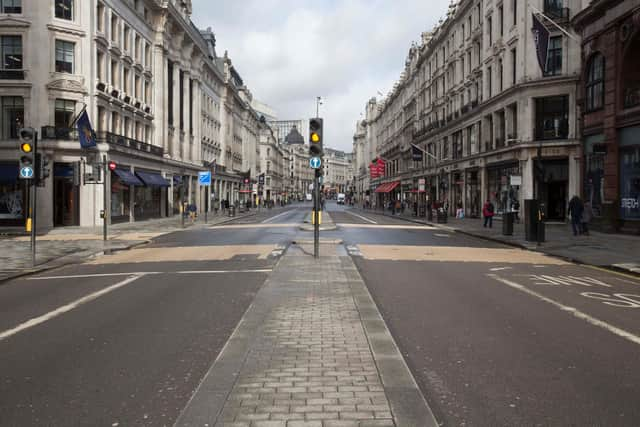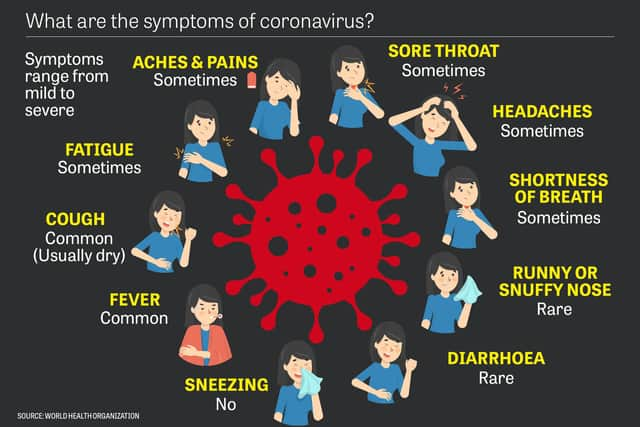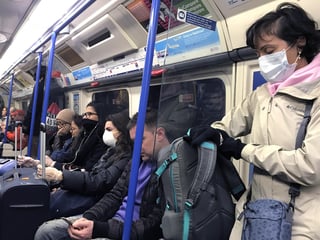Coronavirus: Newborn baby tests positive for Covid-19 in London
and live on Freeview channel 276
The child, whose mother was also diagnosed with Covid-19, is believed to be one of the world’s youngest patients with the disease.
Staff at the north London hospital who came into contact with the pair have been told to self-isolate.
Advertisement
Hide AdAdvertisement
Hide AdThe mother was rushed to hospital days earlier with suspected pneumonia and she and her child are being treated at separate hospitals, The Sun reported.


The newspaper said the woman was tested at North Middlesex Hospital but the result was not known until after the birth.
North Middlesex University Hospital NHS Trust said: ‘Two patients at North Middlesex University Hospital have tested positive for coronavirus.
‘One has been transferred to a specialist centre and one is being treated in an isolation room.
Advertisement
Hide AdAdvertisement
Hide Ad

‘The safety of our patients and staff is our top priority, so in following guidance from Public Health England, we are regularly deep cleaning the areas where the patients are cared for and staff who were in close contact with these patients were advised to self-isolate.’
Chief medical officer for England, Professor Chris Whitty, previously told pregnant women not to start worrying about the coronavirus.
The government website says there is currently no clinical evidence to suggest that the virus can be transmitted through breast milk.
‘Infection can be spread to the baby in the same way as to anyone in close contact with you,’ it says.
Advertisement
Hide AdAdvertisement
Hide AdMeanwhile, the UK's approach to developing ‘herd immunity’ against Covid-19 has been called into question by the World Health Organisation.
Spokeswoman Margaret Harris said not enough is known about the science of the coronavirus, and that while ‘theories’ can be talked about, the current situation requires ‘action’.
Plans are under way to ban mass gatherings from next week as the government looks to implement more extreme measures in the fight against Covid-19.
Boris Johnson had faced criticism for not taking such actions, despite similar steps being taken by other European countries as the pandemic worsens.
Advertisement
Hide AdAdvertisement
Hide AdEmergency legislation bringing in beefed-up powers will be published next week and there could also be a move towards more people working from home, a Whitehall source said.
Coronavirus: the facts – from the NHS and the World Health Organisation
What is coronavirus?
COVID-19 is a respiratory illness that can affect lungs and airways. It is caused by a virus called coronavirus.
What caused coronavirus?
The outbreak started in Wuhan in China in December 2019 and it is thought that the virus, like others of its kind, has come from animals.
How is it spread?
Advertisement
Hide AdAdvertisement
Hide AdAs this is such a new illness, experts still aren’t sure how it is spread. But.similar viruses are spread in cough droplets.
Therefore covering your nose and mouth when sneezing and coughing, and disposing of used tissues straight away is advised.
Viruses like coronavirus cannot live outside the body for very long.
What are the symptoms?
The NHS states that the symptoms are: a dry cough, high temperature and shortness of breath - but these symptoms do not necessarily mean you have the illness.
Advertisement
Hide AdAdvertisement
Hide AdLook out for flu-like symptoms, such as aches and pains, nasal congestion, runny nose and a sore throat.
It’s important to remember that some people may become infected but won’t develop any symptoms or feel unwell.
What precautions can be taken?
Washing your hands with soap and water thoroughly.
The NHS also advises to cover your mouth and nose with a tissue or your sleeve (not your hands) when you cough or sneeze; put used tissues in the bin immediately and try to avoid close contact with people who are unwell.
Also avoiding touching eyes, nose and mouth unless your hands are clean.
Should I avoid public places?
Advertisement
Hide AdAdvertisement
Hide AdMost people who feel well can continue to go to work, school and public places and should only stay at home and self isolate if advised by a medical professional or the coronavirus service.
What should I do if I feel unwell?
Don’t go to your GP but instead call NHS 111 or look online at the coronavirus service that can tell you if you need medical help and what to do next.
When to call NHS 111
NHS 111 should be used if you feel unwell with coronavirus symptoms, have been in a country with a high risk of coronavirus in the last 14 days or if you have been in close contact with someone with the virus.
Comment Guidelines
National World encourages reader discussion on our stories. User feedback, insights and back-and-forth exchanges add a rich layer of context to reporting. Please review our Community Guidelines before commenting.
